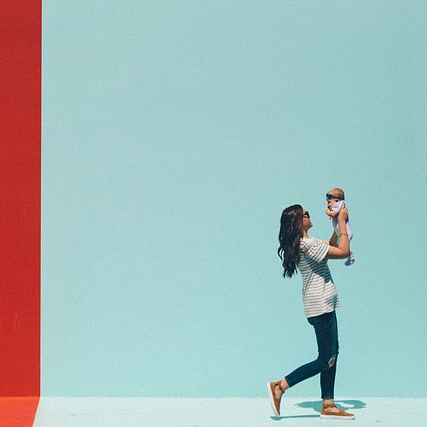Are you a new mom experiencing hair loss? Do you find strands of hair on your pillow, in the shower drain, or tangled in your hairbrush? Don’t worry, you’re not alone. Hair loss postpartum, or telogen effluvium, is a common occurrence that affects many women after giving birth.
We’ll discuss the perfectly normal hormonal changes of estrogen levels during pregnancy that affect your hair growth cycle, identify the signs of hair loss postpartum, provide hair care tips, and present treatment options to promote hair health. By the end of this journey, you’ll understand the reason behind hair loss and what to do about it.
Key Takeaways
How to deal with the emotions of hair loss by finding support.
Professional treatments, nutrition changes, lifestyle adjustments and self care practices can help you regain your confidence during the postpartum period.
Seek medical help if nutrient deficiencies or thyroid disorders are suspected as a cause of hair loss for an effective resolution.

Overcoming Challenges
Dealing with postpartum hair loss is emotionally challenging. Women may experience stress, low self-esteem, and even depression due to their changing appearance. However, remember that postpartum hair loss is temporary and manageable. Mental health professionals can provide therapy or counseling to help you manage your emotions and offer support during this challenging time, while advice from a professional stylist can assist you in finding a hairstyle that enhances your unique features and boosts your confidence.
Actively managing postpartum hair loss is beneficial for your physical and emotional well-being. By seeking support from family and friends, joining a support group, and practicing self-care, you can better cope with this temporary condition.
Finding Support
Friends and family play a significant role in providing meaningful support to someone dealing with hair loss postpartum. They can:
Encourage you to take care of your diet
Be understanding and patient
Help with household chores
Suggest gentle hair care practices
Offer emotional support
In addition to your loved ones, finding support from others who have gone through similar experiences can be incredibly beneficial.
Online communities, such as the “Mane” Forum, provide a safe and encouraging space for women to share their stories and offer support to one another. By joining a support community, you can:
Connect with others who have gone through or are going through the same experience, reducing feelings of isolation and anxiety.
Share experiences, tips, and coping strategies to help each other navigate the challenges of postpartum hair loss.
Promote a sense of belonging and empowerment.
Understanding Postpartum Hair Loss
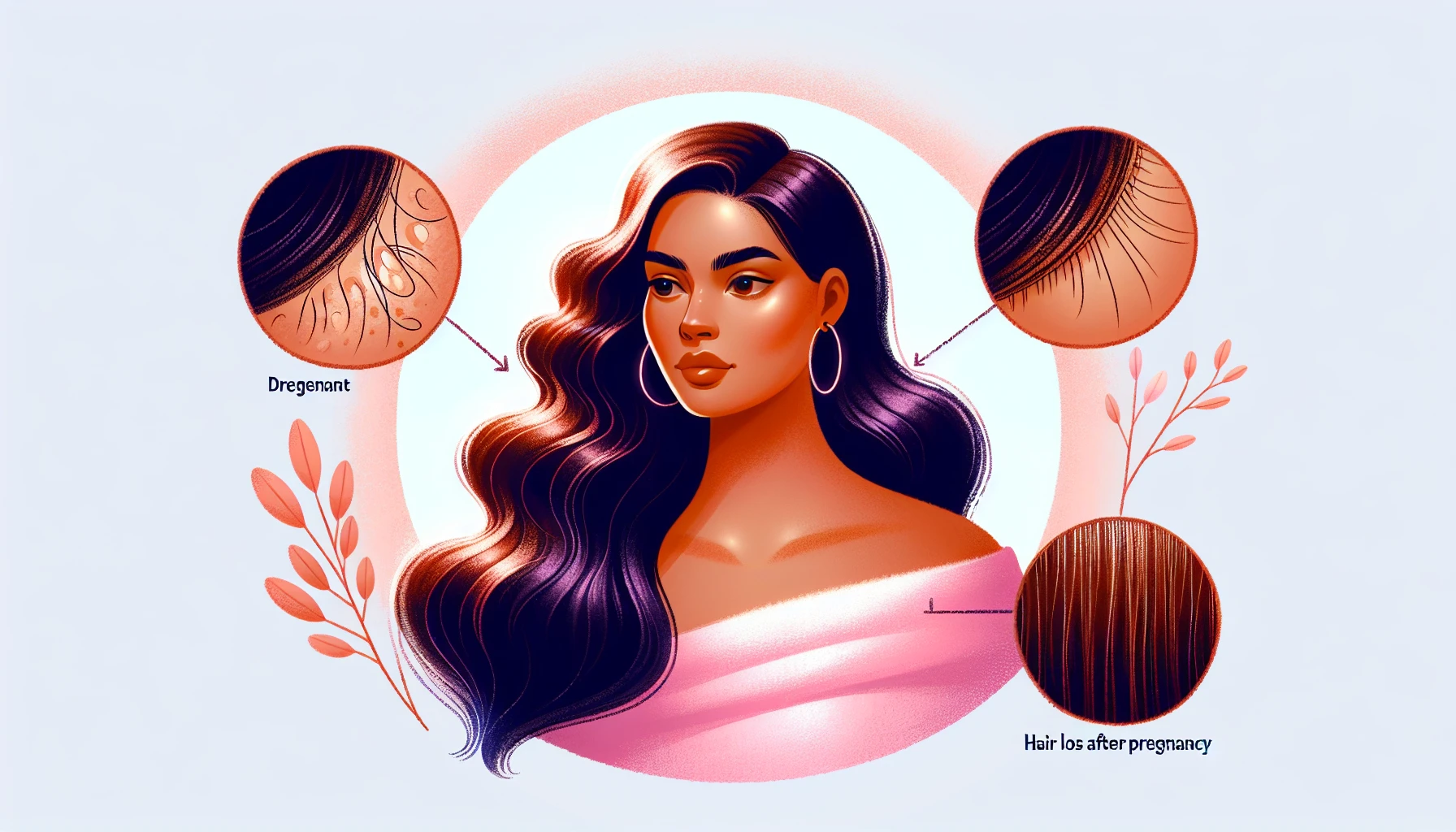
Effective management of postpartum hair loss requires understanding the underlying cause: a shift in pregnancy hormones which causes many hairs in the growing phase to enter the resting phase.
Keep in mind, postpartum hair loss is temporary and typically resolves itself within a few months. Most women will experience this condition to some extent, and while it may feel distressing at the time, knowing that postpartum hair loss happen can provide reassurance and help you focus on taking care of yourself and your baby.
Hormonal Changes During Pregnancy
During pregnancy, the body undergoes significant hormonal changes, notably an increase in progesterone and estrogen levels. These hormonal shifts positively impact the hair growth cycle, particularly by prolonging the anagen phase, which is the active growth stage of hair follicles. This typically results in hair appearing denser and more vibrant.
However, post-delivery, there’s a marked decrease in estrogen and progesterone levels. This hormonal shift disrupts the hair growth cycle, moving a large number of hair follicles from the growth phase to the shedding phase, known as telogen. This excessive shedding is a primary factor in postpartum hair loss. By understanding these physiological changes, one can better anticipate and manage the challenges of postpartum hair loss, adopting strategies to mitigate its impact.
The Hair Growth Cycle
The hair cycle is a fascinating process consisting of three phases:
Anagen (growth): During this phase, your hair grows continuously.
Catagen (transition): This is a brief transitional stage where hair growth slows down and follicles shrink.
Telogen (rest): This is a resting period when hair strands remain in their follicles but are not actively growing.
During pregnancy, the hormonal changes cause an increase in the number of hairs in the anagen phase, leading to thicker and fuller hair. However, after giving birth, estrogen levels decline, causing many of these hairs to enter the telogen phase.
Identifying Postpartum Hair Loss
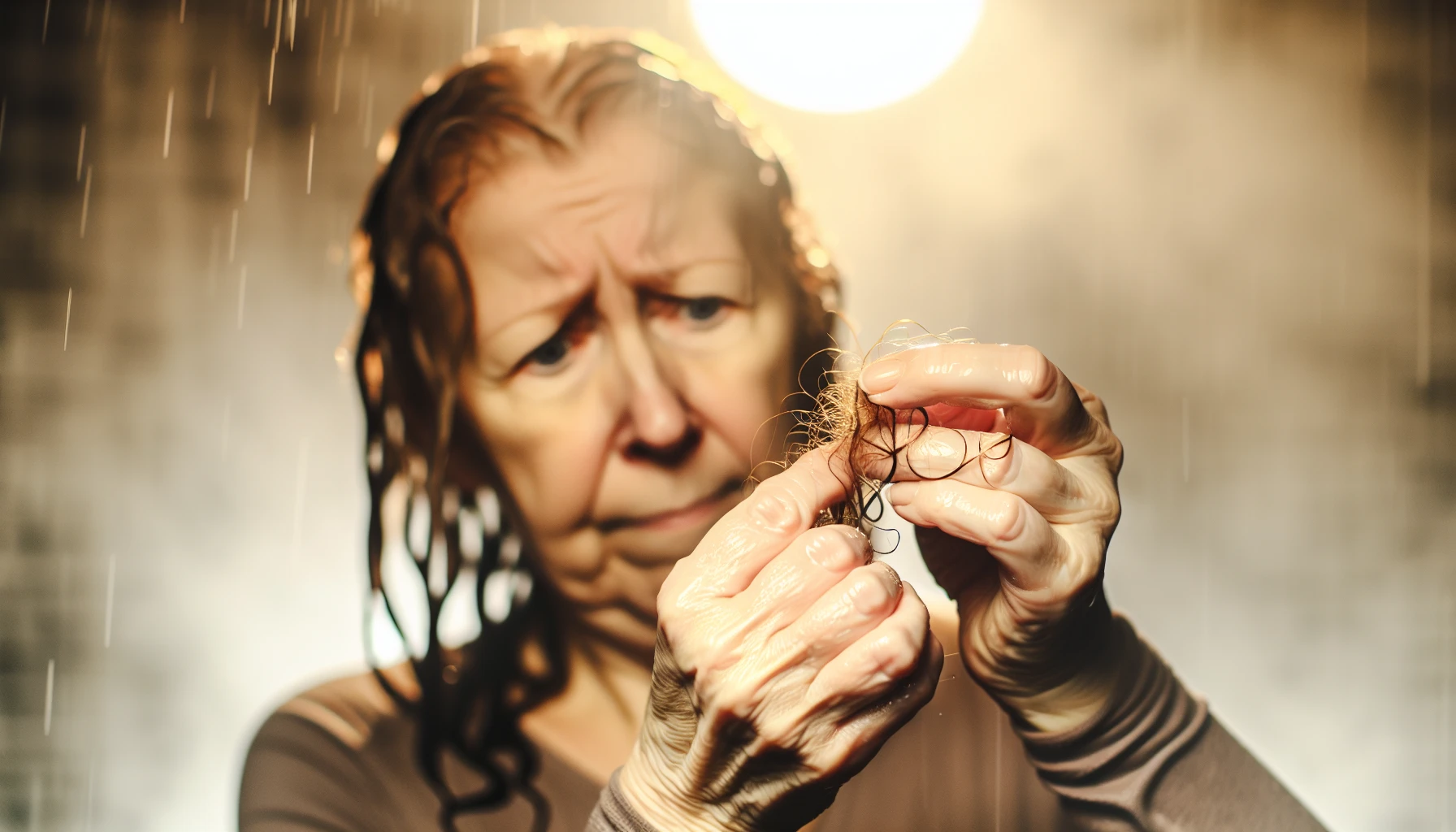
To effectively address noticeable hair loss, it’s essential to identify the signs and patterns of this condition. Postpartum hair loss starts typically around 3-5 months after giving birth. The most common indicator of postpartum hair loss is an unusually high amount of hair shedding, which may be found in clumps or on brushes, linens, shower drains, or clothes.
The patterns of hair shedding can vary from overall thinning to noticeable hairline loss. Understanding the exact problem can help you take appropriate measures such as using volumizing shampoos, avoiding conditioning shampoos, and getting a haircut with bangs and layers. Remember that postpartum hair loss is temporary and should resolve within six months.
Managing Postpartum Hair Loss

Taking proactive steps to manage postpartum hair loss can help you regain your confidence and feel more comfortable in your skin. Remember, it’s important to be patient and gentle with yourself during this time, as your body is still recovering from the challenges of pregnancy and childbirth.
Hair Care Tips
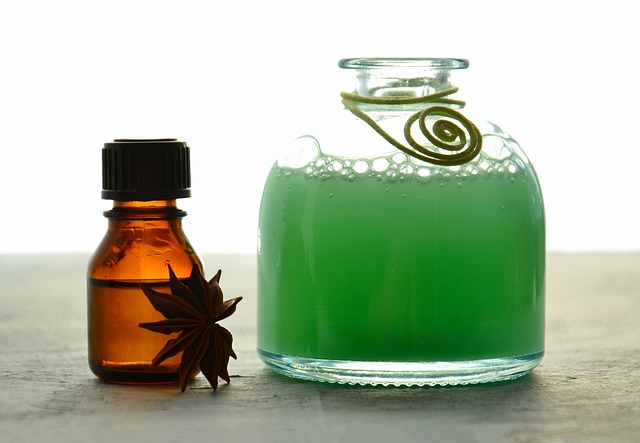
These are the DO’s:
Opt for volumizing shampoos that can help add volume and strength to your hair.
Avoid conditioning shampoos, as they can weigh down your hair and make it appear even thinner.
Choose a lightweight conditioner designed for fine hair to keep your hair light and bouncy.
Embrace natural textures and avoid tight hairstyles to prevent further hair loss.
Be gentle with your hair and avoid using harsh styling tools, such as flat irons, curling irons, and blow dryers, as they can cause further damage and hair loss.
Getting a haircut with bangs and layers can help you confidently conceal hair loss at the hairline and give you a fresh look. Consult with a professional stylist to find a hairstyle that works well with your thinning hair and helps you feel more confident and attractive. Stylish hair accessories, like headbands and scarves, can also help you feel confident while covering up hair loss.
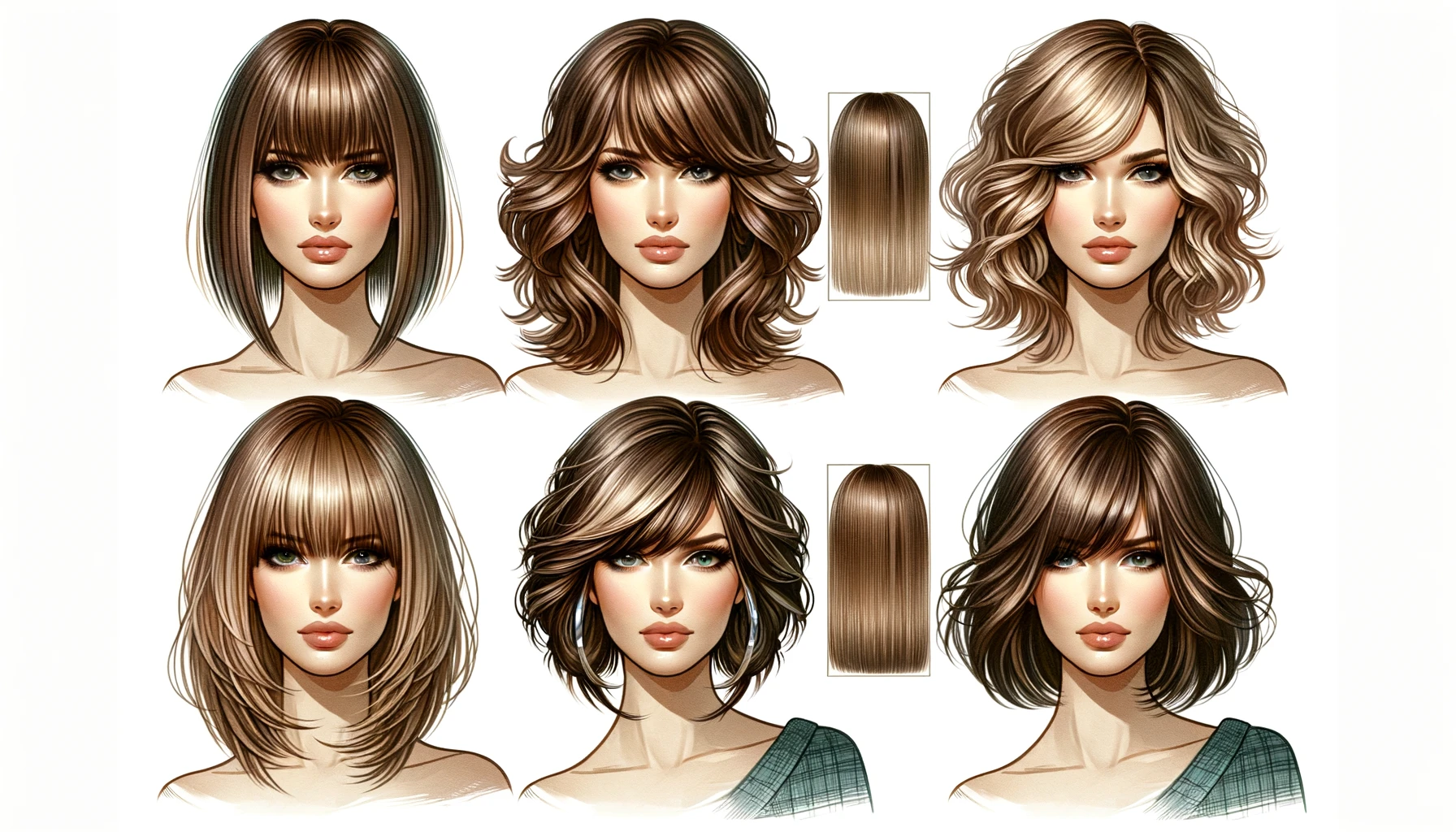
Nutrition
A balanced diet plays a pivotal role in combating postpartum hair loss, providing the essential nutrients needed for robust hair growth. For example, incorporating a variety of proteins, like salmon, which is rich in omega-3 fatty acids, can significantly enhance hair strength. Including eggs, a source of biotin and other vitamins, contributes to hair health. Vegetables like spinach, rich in iron, vitamins A and C, and folate, also support healthy hair growth, addressing common deficiencies seen in postpartum women.
Adding a rainbow of fruits to your diet, such as berries packed with antioxidants and vitamin C, can help protect hair follicles against damage. Nuts and seeds, like almonds and flaxseeds, offer vitamin E, zinc, and selenium, further aiding in hair strength and recovery. Additionally, whole grains provide essential B vitamins, vital for hair growth.
Hydration is equally crucial. Drinking at least eight glasses of water daily can maintain hair hydration, promoting growth and preventing dryness and brittleness, which are precursors to hair loss. An example of this is seen in women who increase their water intake and report a noticeable improvement in hair texture and reduced hair fall. Thus, a well-rounded diet combined with adequate hydration forms a strong foundation for healthy hair postpartum, echoing the adage that beauty truly does come from within.
Treatment Options for Postpartum Hair Loss
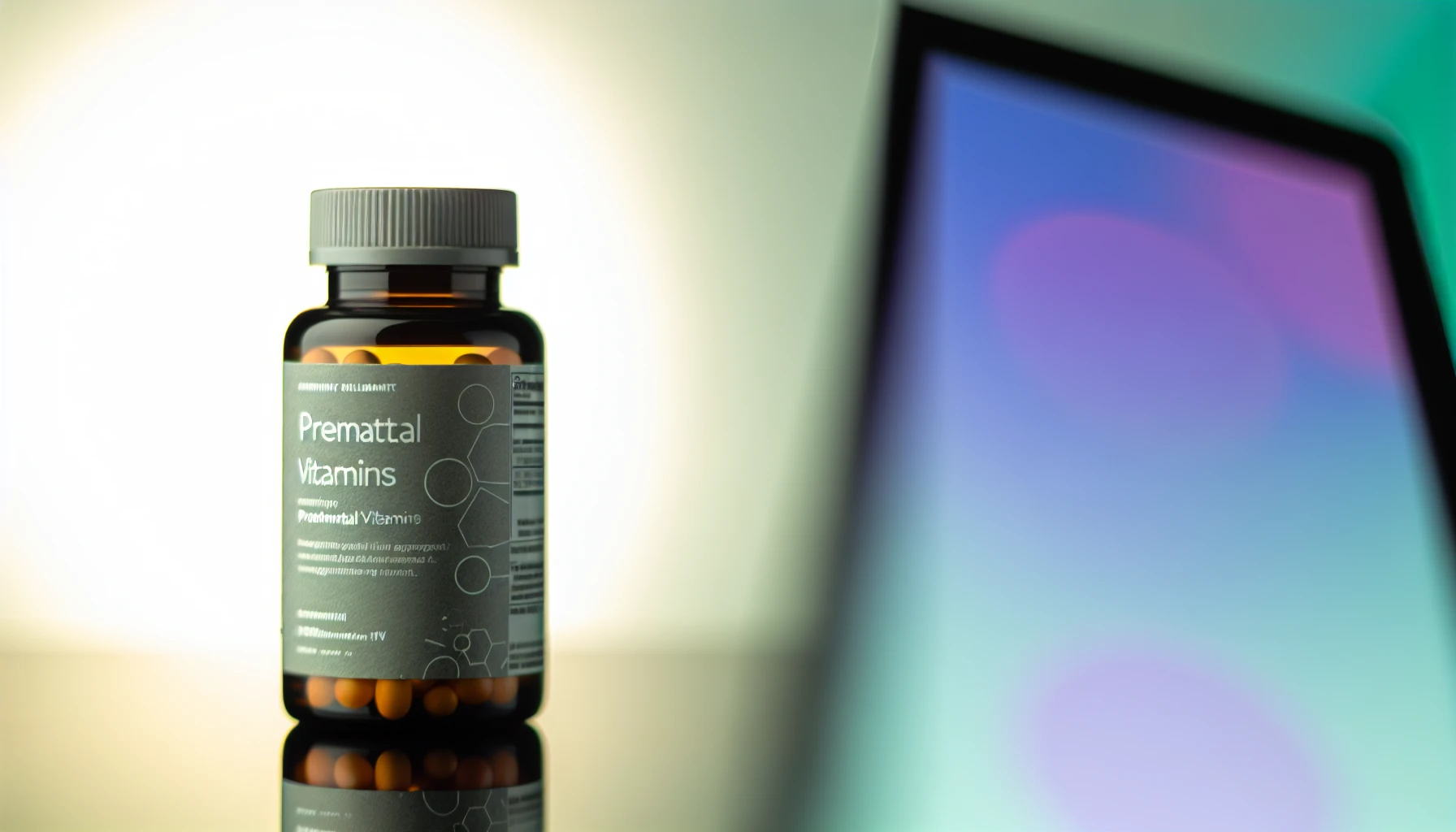
In some cases, you might consider seeking professional treatments to help manage postpartum hair loss. Some options include:
Prenatal vitamins and supplements, such as biotin and collagen, which can support hair growth and minimize hair loss
Topical minoxidil, a medication that promotes hair growth
Platelet-rich plasma (PRP) therapy, a procedure that involves injecting your own platelet-rich plasma into your scalp to stimulate hair growth
These professional treatments can be highly effective to treat postpartum hair loss.
The following sections will cover prenatal vitamins and supplements, along with professional treatments that can help effectively manage postpartum hair loss.
Prenatal Vitamins and Supplements
Taking prenatal vitamins and supplements, like biotin and collagen, can be beneficial in promoting hair growth and minimizing postpartum hair loss. Biotin is known to strengthen hair and nails, while collagen provides essential amino acids that encourage healthy and strong hair growth. To promote hair growth effectively, it’s important to consult with your OBGYN before taking any supplements to ensure they are safe and effective for you, especially if you are pregnant or breastfeeding.
Professional Treatments
Platelet-rich plasma (PRP) therapy is an advanced professional treatment for postpartum hair loss that can help you get back to feeling your best. It involves injecting a concentrated solution of platelets into the scalp to stimulate hair growth. The usual treatment plan involves three sessions over three months to ensure the best possible results. While PRP therapy addresses hair loss, it is important to be aware of other hair-related concerns, such as a hair tourniquet, which may require different interventions.
Topical minoxidil has also been proven to be highly successful in treating postpartum hair loss, with studies demonstrating the effectiveness of both 2% and 5% topical minoxidil solutions in stimulating hair growth. By exploring these professional treatments, you can find the best solution for your individual needs and regain your confidence.
When to Seek Medical Help
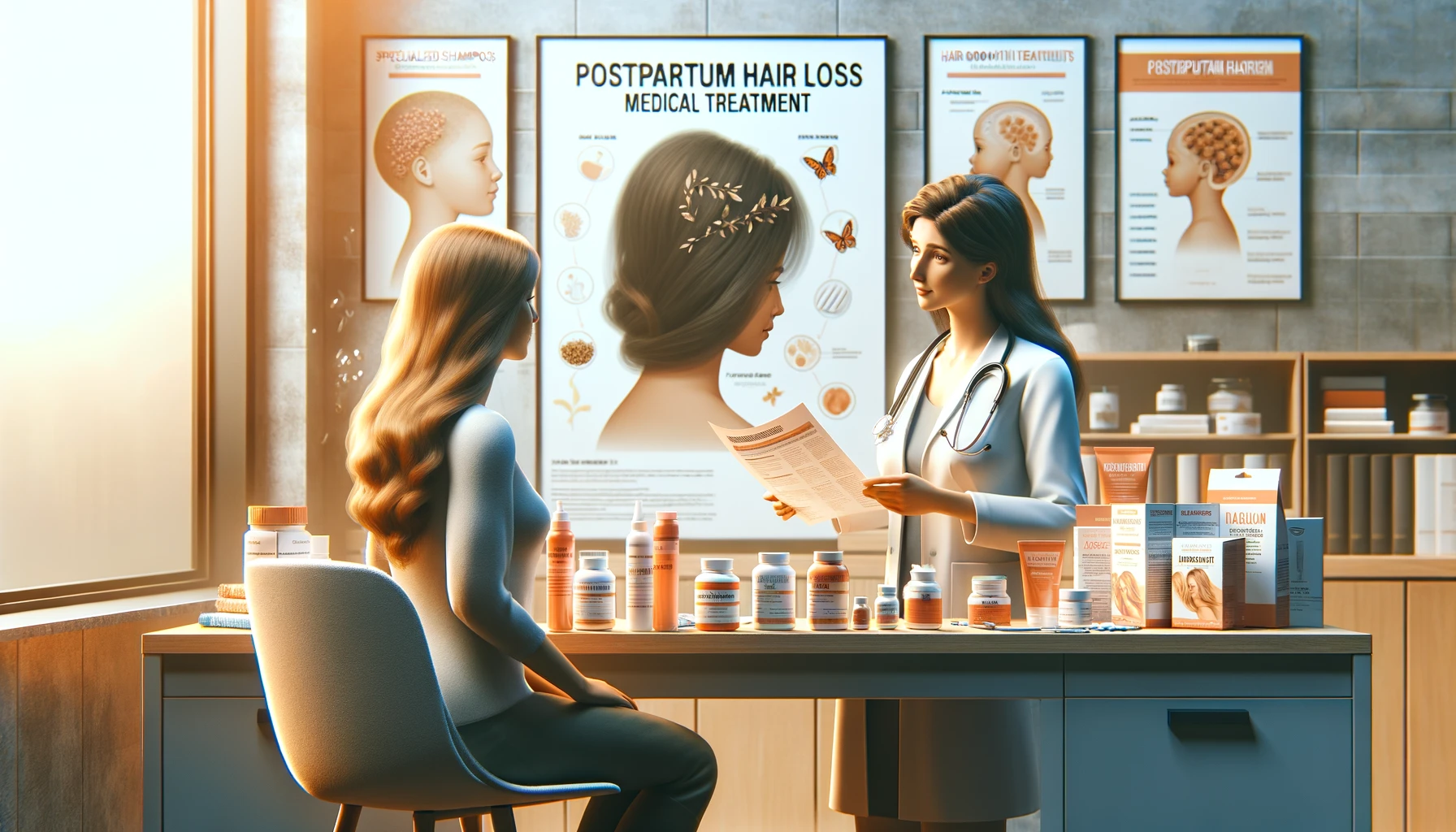
While postpartum hair loss is common and usually resolves itself within a few months, it’s important to seek medical help if you suspect that nutrient deficiencies or thyroid disorders may be the cause of your hair loss. Anemia and other vitamin and mineral deficiencies can significantly contribute to hair loss and may require medical intervention. Thyroid disorders, such as hypothyroidism or hyperthyroidism, can also cause hair loss and may need medical treatment.
The following sections will cover potential nutrient deficiencies and thyroid disorders that can contribute to hair loss. By understanding these underlying causes, you can take appropriate action and seek the necessary medical help to address your hair loss effectively.
Nutrient Deficiencies

Nutrient deficiencies, such as iron or vitamin D, can significantly contribute to hair loss and may require medical intervention. Iron is a key component in the production of hemoglobin, a protein in red blood cells that carries oxygen to the hair follicles. When iron levels are low, it can lead to a condition called iron deficiency anemia, which can cause hair shedding and hair falls.
Vitamin D stimulates hair follicles, so deficiency in this vitamin can lead to hair loss due to a lack of cells and follicles required for hair growth. If you suspect that nutrient deficiencies may be the cause of your postpartum hair loss, consult your healthcare provider for advice and potential treatment options.
Thyroid Disorders
Thyroid disorders, such as hypothyroidism or hyperthyroidism, can cause hair loss and may need medical treatment. Both conditions can disrupt the normal hair growth cycle, leading to hair thinning or bald patches. Proper management and treatment of the thyroid disorder can help resolve hair loss and promote healthy hair growth.
If you suspect that a thyroid disorder may be the cause of your postpartum hair loss, consult your healthcare provider for advice and potential treatment options.
FAQs
Question: Is postpartum hair loss a common condition? Answer: Yes, postpartum hair loss is a common condition that affects many women after giving birth.
Question: How long does postpartum hair loss typically last? Answer: Postpartum hair loss typically lasts for about three to six months.
Question: What can I do to manage and prevent postpartum hair loss? Answer: You can take proactive steps to manage and prevent postpartum hair loss, such as using volumizing shampoos, avoiding conditioning shampoos, and getting a haircut with bangs and layers.
Question: Are there any professional treatments available for postpartum hair loss? Answer: Yes, professional treatments like platelet-rich plasma (PRP) therapy and topical minoxidil are highly effective options for postpartum hair loss.
Question: When should I seek medical help for postpartum hair loss? Answer: It’s important to speak to a doctor about postpartum hair loss if you’re still losing hair after six months or if you’re experiencing chronic hair loss for six months or longer.
Summary
In conclusion, postpartum hair loss is a common and temporary condition that affects many women after giving birth. By understanding the underlying hormonal changes and hair growth cycle, identifying the signs and patterns of hair loss, implementing hair care tips, making nutrition and lifestyle changes, and exploring treatment options, you can effectively manage postpartum hair loss and regain your confidence. Remember, you’re not alone in this journey, and with the right knowledge and support, you can overcome this temporary challenge and enjoy healthy, beautiful hair once again.
Frequently Asked Questions
Can breastfeeding cause hair loss?
It’s reassuring to know that breastfeeding does not cause hair loss. Increased hair shedding due to changing hormone levels is common during breastfeeding and postpartum, causing thinning hair or excessive shedding.
How long does postpartum hair loss last?
Postpartum hair loss is a common condition that usually occurs around three months after childbirth and can last up to six months. Most women experience a return to normal hair growth within a year of giving birth, so there’s no need to worry; your hair will eventually grow back!
What is good for postpartum hair loss?
Eating a healthy and balanced diet, as well as using volumizing shampoos and lighter conditioners can help with postpartum hair loss by adding body to your hair and preventing further hair loss and damage.
How can I reduce my postpartum hair loss naturally?
To reduce postpartum hair loss naturally, you should skip the styling and treat your hair gently, add volume to it with volumizing shampoos and conditioners, opt for a shorter haircut if needed, supplement your diet with vitamins A, C, D, E, Zinc and Biotin, and consume fish or flaxseed oils.
